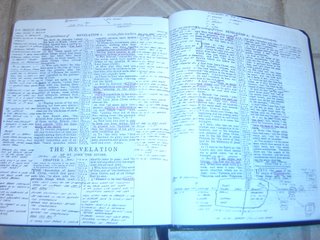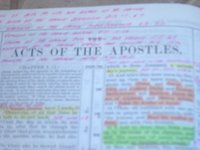
The last post concerning spiritual growth should not be perceived to be the most important. In fact, this series will be somewhat disjointed and I will write as things come to mind during my own contemplation of what has gone into my own spiritual growth. I have come to understand that spiritual growth is a constant battle (Ephesians 6:10-18; 1 Peter 5:8; 2 Corinthians 4:4) and it will continue to remain until we are released from our battle. I once heard J. T. Pugh state, “There are no permanent spiritual victories this side of the Rapture.”
The second principle that I find in spiritual growth:
2. Feast on the Word
John Cumming -- The empire of Caesar is gone, the legions of
Bernard Ramm in Protestant Christian Evidences: A thousand times over the death knell of the Bible has been sounded, the funeral procession formed, the inscription cut on the tombstone and the committal read. But somehow the corpse never stays put.
Augustine -- The Scriptures are our letters from home.
Martin Luther -- The Bible is alive, it speaks to me; it has feet, it runs after me; it has hands, it lays hold on me.”
John Bunyan -- I never knew all there was in the Bible until I spent those years in jail. I was constantly finding new treasures.
George Meuller -- The vigor of our spiritual life will be in exact proportion to the place held by the Bible in our life and thoughts.
Charles Spurgeon -- Nobody ever outgrows Scripture; the book widens and deepens with our years.
Robert E. Lee -- In all my perplexities and distresses, the Bible has never failed to give me light and strength.
Ulysses S. Grant -- Hold fast to the Bible as the sheet-anchor of your liberties; write it’s precepts in your hearts, and practice them in your lives. To the influence of this book we are indebted for all the progress made in true civilization, and to this we must look as our guide in the future.
Woodrow Wilson -- I am sorry for the men who do not read the Bible everyday; I wonder why they deprive themselves of the strength and of the pleasure.
Dwight D. Eisenhower -- The Bible is endorsed by the ages. Our civilization is built upon its words. In no other book is there such a collection of inspired wisdom, reality, and hope.
Ronald Reagan -- I never had any doubt about it being of divine origin. . . . Point out to me any similar collection of writings that has lasted for as many thousands of years and it still a bestseller, worldwide. It had to be of divine origin.
Immanuel Kant -- A single line in the Bible has consoled me more than all the books I ever read besides.
Johann Wolfgang von Goethe -- The Bible grows more beautiful, as we grow in our understanding of it.
Sir Walter Scott -- The most learned, acute, and diligent student cannot, in the longest life, obtain an entire knowledge of the Bible. The more deeply he works the mine; the richer and more abundant he finds the ore.
Charles Dickens -- The New Testament is the best book the world has ever known or will know.
Helen Keller -- The Bible gives me a deep, comforting sense that 'things seen are temporal, and things unseen are eternal'.
I am certain that I have really never truly been able to understand the value of the Word of God. In my early twenties, I discovered the depth and the power of the Word during times of forced study during my
When I first begin to put sermons together, because it was my desire for those messages to be so biblically driven, I filled those messages full of Scripture. Admittedly sometimes these early sermons had a lot of the Word in them but still in retrospect, I do not think it was too much. This Word is the only real way for me to understand what God thinks and intends for my life.
Read Your Bible
Far too many only read the Bible when they are in church. This is sad. There is a famine in the land. . . . not a famine of bread but of the Word of God (Amos 8:11). Never has a generation had so many anemic saints. They have no spiritual immunity to fight the enemy with because their “ingestion” of the Bible has been limited to milk and they have never learned to have the meat. 1 Peter 1 urges us to add, add, add, add things to our lives. By adding these things to our lives, our spiritual immunity is built up against spiritual maladies that hinder our progress.
A good plan to read through the Bible exists. To read through the Bible in one year one will have to read only four chapters every day. To fulfill this task in six months, read eight chapters a day. Another method is to take certain books of the New Testament and break it down. For instance, take Matthew 1-7 and read it every day for 30 days. At the end of that time, take Matthew 8-14 and read it every day for 30 days. At the end of a three year period, following this method, one will have read through the entire New Testament thirty times. At that point, there is no doubt in my mind that you will have such a Word saturated life that every decision you make will be filtered through the lens of Scripture.
There are numerous Bibles now that are printed as “one year” Bibles and they have been broken down with daily dates. This makes your assignment very easy. Also, a very good Bible reading program that you can find on Google is Robert Murray M’Cheyne’s chart. You can also e-mail me and I will send an Excell and Word file to you (barnabas14@graceba.net) to assist you.
M’Cheyne’s chart will help you read through the Bible in one year with the New Testament and Psalms twice.
Mark Your Bible
For years, I handled my own personal Bible with great respect (and I still do) and would never, ever would dare mark in it. I felt that to “mark up” a Bible would be anathema. At one time or another, we all have been walking across parking lots and noticed Bibles tossed up in the back window of cars. The heat and the light has caused so much damage to the curled pages that this valuable treasure is good for nothing but the trash. This nearly criminal to see how that someone would not value the words of life. How a man treats his personal Bible says far more about him than one might perceive.
I continued with this thought until I met Kelsey Griffin. His wide-margin Bible is something of a legend and at that point I understood the importance of writing in my own Bible. His Bible and his marginal writings proved to be very helpful whenever he was asked to preach or teach unexpectedly or someone would ask him a question.
After a time of trial and error with marking my Bible, I finally came up with a fairly good system that works for me. First, I would find all the doctrinal areas and mark them in red. Once this verse was underlined in red, then I would write very neatly another verse reference and the topic that I was “chaining” together directly beside this verse. By doing this, the verses would be linked together and I would have a multitude of Scriptures to follow along with. The advantage of using red would key me into understanding that this was an important doctrinal truth and when I was flipping through the pages, the red color would stand out to me. I did use David Bernard’s very handy little A Handbook of Basic Doctrines.
As time progressed, my Bibles (I probably have too many) have become very neatly marked with copious notes. I write side notes, between the lines, in the front and back on the blank pages, all of which have been helpful to me. By doing this sort of writing in your Bible, it becomes “yours” and the real value of this Bible will only come when you have passed on (what a thought).
Marking verbs can really make a chapter stand out to you. Take a look at 1 Corinthians 13 and notice what charity or love does. Take a look at Psalm 37 and mark what your responsibility is and what God’s responsibility is. My responsibility is in verse one is simple: Do not fret over evildoers and do not be envious of the workers of iniquity. God’s responsibility starts in verse two: He will cut them down like grass and wither them as the green herbs. The best way to mark this is with two different colors of ink. In my Bible, I alternately used orange and blue.
Another exercise would be to take Psalm 119 and mark all of the descriptions of what God states that the Word of God is. Notice: The Law of the Lord, His testimonies, His statues, commandments, and so on. When you begin to mark this in this manner, it provides you with a fantastic description of what the Word of God is. In this same chapter, look at what happens to the man who finds the Law of God filling his life: Your are blessed, you do not do iniquity, you will walk in the way of God and so on.
Another way to mark your Bible is by writing outlines in the margins. This causes us to “boil down” a passage of Scripture and see the lessons and principles that are brought out. By doing this, you are building your own commentary. I have also discovered that the more that I write in my Bible that more ideas come to me as to exactly what system to use when writing in this Bible.
Another way to mark your Bible is to take an entire book and place notes all throughout this book. You can mark characters, nationalities, cross-references, chapter outlines, and so on. I did this with the book of Acts sometime back and it was very helpful to me.
Another way to mark your Bible is to look for things that are emphasized, things that are repeated, things that are related, things that are alike and different, and things that are true to life.
One friend of mine has started a very noble task with his children. He has purchased several wide-margin Bibles and is writing his sermon notes and Bible studies in the margins and will present them with “his” Bible when they leave home. What an impact that could be made on a child’s life. Obviously, when they initially leave home the value of this will not really hit them but as they get older the value of this spiritual heirloom will heighten in such a way that this very well could be one his children’s most valued possessions.
Make the Characters Speak
Another helpful thing to do with this feast of the Word is to take the characters and make them walk up and down in your living room, office, or wherever you may study. Pull Joseph from the pit, the prison, and the palace and allow the descriptions you have found in Scripture to drive the conversation. Pull Daniel from his prayer room, from the lion’s den, or from the royal halls of the Babylonians and let him “speak” to you. Take a journey with Paul through the missionary trips and let the dangerous journeys encourage you to take a risk and invest your life in the Kingdom.
By making the characters speak to you, you gain insight into how they faced difficulties in life. See Elijah fighting depression, note Abraham and Sarah struggling with doubt, see Jeremiah’s weeping, and allow yourself to feel Ananias’ fear when he was to go pray for Saul (Paul). Put yourself in their shoes and see how you measure up.
Our generation needs godly heroes and the way to gain character qualities in your life is to expose your life to God’s men in the Book.
Apply Your Bible
All the feasting on the Word is worthless if you are only a “hearer” and not a “doer” (James 1:22). So I am going to leave you with a list from an “old” book entitled Living By The Book written by Howard Hendricks.
To apply the Word you have to know yourself. This inventory will help you to get a grasp on the real you.
In Your Personal Life
- What is the status of your spiritual disciplines—disciplines well known to correlate with spiritual growth, such as Bible study, Scripture memory, prayer, or the reading of devotional literature?
- What about your physical condition and habits or eating, exercise, sleep, and rest?
- What behaviors do you especially desire to overcome: a temper, a deception, or sexual lust?
- What behaviors do you especially desire to establish: patience, or hospitality, or perseverance?
In Your Family Life
- Do you have a set come-home time from work that your family can count on
- Do you “date” your spouse regularly?
- Do you disengage emotionally from work and chores in order to spend unimpeded time involved with your children?
- Are you upholding your responsibilities to your parents? To your spouses’ parents? To other relatives?
In Your Church Life
- How often do you place yourself under the instruction of Scripture?
- Do you faithfully, generously, and joyfully donate money to the cause of Christ?
- Are you praying regularly for your pastor and other church leaders?
- Do you know what your spiritual gift is, and are you using it?
In Your Work
- Do you give an honest day’s labor to your employer?
- Do you follow through on commitments you make to your customers?
- Do you read and otherwise stay up on new developments, ideas, and methods in your field?
- To the extent that you can, do you hold a steady job by which your needs and those of your family are being adequately met?
- Do you have a family budget? Do you stay within it?
In Your Community
- Do you regularly exercise your right and responsibility as a citizen to cast an informed vote?
- Do you pay your fair share of taxes?
- What is the status of your driving record?
- Do you maintain your property within the statutes of your community?
- Are you in any conscious of and involved with the poor and their needs?
There are numerous other questions that could be asked but all of this questions in this inventory are directly covered by instructions in the Word.
Now, go feast on the Word. . . . not just today or tomorrow. . . but for the rest of your life!




3 comments:
This is excellent. Sandra Dillon
Nice post.
I'm still wavering between the wide margin ESV that is coming out this month, and the ESV offered by Allen of Glasgow. Argh.
Thanks.
Nice post.
I'm still wavering between the wide margin ESV that is coming out this month, and the ESV offered by Allen of Glasgow. Argh.
Thanks.
Post a Comment